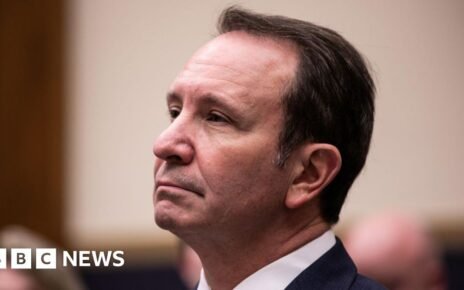[ad_1]
Other EU leaders have expressed concern over media reports that Hungarian Prime Minister Viktor Orban may be meeting Russian President Vladimir Putin in Moscow on Friday.
Mr Orban – whose country now holds the EU rotating presidency – is the bloc’s only head of national government to have kept close ties to the Kremlin following its full-scale invasion of Ukraine in 2022.
European Council President Charles Michel said Mr Orban had “no mandate to engage with Russia on behalf of the EU”, while Polish PM Donald Tusk asked for clarification.
Several media outlets reported about Mr Orban’s apparent forthcoming visit, quoting their sources.
Radio Free Europe/Radio Liberty, a US-government funded media organisation, quoted a Hungarian government source. It also said that Hungarian Foreign Minister Peter Szijjarto would accompany Mr Orban.
Hungary and Russia did not immediately respond to BBC requests for comment.
On Monday, according to AFP news agency, Mr Orban promised “surprising news from surprising places”.
In a post on X, Mr Michel wrote: “The EU rotating presidency has no mandate to engage with Russia on behalf of the EU.
“The European Council is clear: Russia is the aggressor, Ukraine is the victim. No discussions about Ukraine can take place without Ukraine.”
Mr Tusk asked: “The rumours about your visit to Moscow cannot be true@PM_ViktorOrban, or can they?”
Earlier this week, Mr Orban visited Kyiv, saying a “a quick ceasefire could be used to speed up peace negotiations”.
Ukrainian President Volodymyr Zelensky – who has had frosty relations with Mr Orban – did not publicly respond to the proposal.
But many Ukrainians believe any ceasefire would simply cement Russia’s hold over territory it has seized from Ukraine and, if negotiations were to take place, they would prefer them to be conducted from a position of strength rather than on the back foot.
Media speculation about Mr Orban’s visit to Moscow came as President Putin said again that he was open to negotiating with Kyiv.
The Kremlin leader recently publicly voiced a number of tough pre-conditions for such talks but Kyiv and its Western allies say these are tantamount to Ukraine’s capitulation.
Mr Orban has been a vocal critic of Western support for Ukraine. He previously slowed agreement on a €50bn ($54bn; £42bn) EU aid package designed to support Ukraine in its defence against Russia.
Tuesday’s visit to Kyiv was his first in 12 years, although he met Mr Putin repeatedly during that time.
During Mr Orban’s joint appearance with Mr Zelensky the body language between them was not warm, and neither took questions from the media after they gave their statements.
But for the next six months Mr Orban’s position as head of the European Council means he has an influential role as a figurehead for Europe.
He came to Ukraine on his second day in that role for discussions, saying there was a need to solve previous disagreements and focus on the future.
[ad_2]
Source link freeslots dinogame telegram营销



